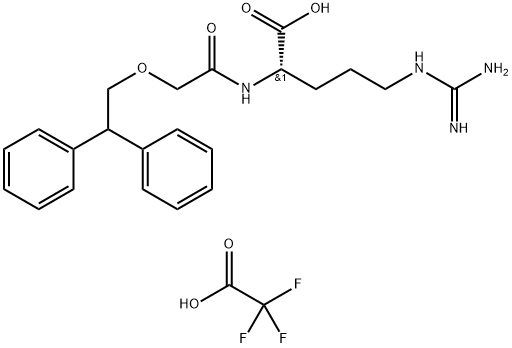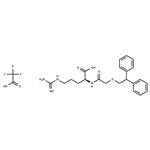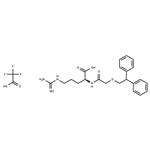Uses
SB 290157 Trifluoroacetate Salt is a selective, high affinity, competitive antagonist of anaphylatoxin C3a receptor.
General Description
A non-peptide with anti-inflammatory properties that acts as a selective, high affinity, competitive antagonist of the anaphylatoxin C3a receptor (C3aR; IC
50 = 200 nM). Does not antagonize C5aR or other chemotactic G-protein coupled receptors. Blocks C3a-induced internalization of C3aR in human neutrophils and C3a-induced Ca
2+ mobilization in basophilic leukemia RBL-2H3 cells expressing murine, guinea pig, or human C3aR (IC
50 = 7, 12.5, and 27.7 nM, respectively). Also blocks C3a-mediated ATP release from guinea pig platelets (IC
50 = 30 nM).
Biological Activity
sb 290157 is a c3ar antagonist.the anaphylatoxin c3a, a potent chemotactic peptide and inflammatory mediator, binds to and activates a g-protein-coupled receptor. molecular cloning of the c3ar has facilitated the identification of the non-peptide c3ar antagonists.
Biochem/physiol Actions
Target IC50: 200 nM against the anaphylatoxin C3a receptor; 7, 12.5, and 27.7 nM, in blocking C3a-induced internalization of C3aR in human neutrophils and C3a-induced Ca2+ mobilization in basophilic leukemia RBL-2H3 cells expressing murine, guinea pig, or human C3aR
in vitro
sb 290157 was a competitive antagonist of 125i-c3a and binding to rat basophilic leukemia (rbl)-2h3 cells expressing the human c3ar , with an ic50 of 200 nm. sb 290157 could also block the c3a-induced c3ar internalization concentration-dependently and c3a-induced ca21 mobilization in rbl-c3ar cells and human neutrophils. sb 290157 was founf to be selective for the c3ar in that it did not antagonize the c5ar or six other chemotactic g protein-coupled receptors. in addition, sb 290157 could also inhibit c3a induced ca21 mobilization of rbl-2h3 cells expressing the mouse and guinea pig c3ars [1].
in vivo
in animal models, sb 290157 was able to inhibit neutrophil recruitment in a guinea pig lps-induced airway neutrophilia model and decrease paw edema in a rat adjuvant-induced arthritis model [1].
References
[1] r. s. ames, d. lee, j. j. foley, et al. identification of a selective nonpeptide antagonist of the anaphylatoxin c3a receptor that demonstrates antiinflammatory activity in animal models. journal of immunology 166(10), 6341-6348 (2001).


